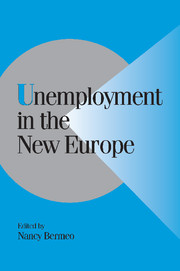Book contents
- Frontmatter
- Contents
- List of Contributors
- INTRODUCTION
- Part I Macroeconomic Contexts and Models
- Part II Unemployment and Domestic Bargaining Institutions: Challenging Some Myths
- Part III Unemployment and Domestic Bargaining Institutions: Three Cases
- Part IV Unemployment, Voting, and Political Behavior
- 9 DESPERATE TIMES CALL FOR DESPERATE MEASURES? UNEMPLOYMENT AND CITIZEN BEHAVIOR IN COMPARATIVE PERSPECTIVE
- 10 THE POLITICS OF UNEMPLOYMENT: THE SPANISH EXPERIENCE IN COMPARATIVE PERSPECTIVE
- 11 CONCLUSION: UNEMPLOYMENT, THE NEW EUROPE, AND THE OLD INEQUALITIES
- Index
11 - CONCLUSION: UNEMPLOYMENT, THE NEW EUROPE, AND THE OLD INEQUALITIES
Published online by Cambridge University Press: 26 March 2010
- Frontmatter
- Contents
- List of Contributors
- INTRODUCTION
- Part I Macroeconomic Contexts and Models
- Part II Unemployment and Domestic Bargaining Institutions: Challenging Some Myths
- Part III Unemployment and Domestic Bargaining Institutions: Three Cases
- Part IV Unemployment, Voting, and Political Behavior
- 9 DESPERATE TIMES CALL FOR DESPERATE MEASURES? UNEMPLOYMENT AND CITIZEN BEHAVIOR IN COMPARATIVE PERSPECTIVE
- 10 THE POLITICS OF UNEMPLOYMENT: THE SPANISH EXPERIENCE IN COMPARATIVE PERSPECTIVE
- 11 CONCLUSION: UNEMPLOYMENT, THE NEW EUROPE, AND THE OLD INEQUALITIES
- Index
Summary
Unification has the nasty habit of creating division, and opinions are certainly divided over the merits of a united and liberalized European market. Where some fear that the “surf of market forces” will turn the New Europe into “post-modern flatlands” (Gowan and Anderson 1997: xiv), others are convinced that marketization is the only means of ensuring economic buoyancy. The essays in this collection are reactions to both these perspectives. They are also reactions to the coincidence of high unemployment with the high-gear drive toward monetary and economic union.
Though this research project began with no political agenda, the sum of its parts yields a message with important implications for employment policy: the organized managed economies of Europe should be reformed but not replaced. A united Europe should be wary of modeling itself on the United States.
I defend this argument by integrating evidence from the collection's essays with a closer and more critical look at the workings of the paradigmatic example of the liberal model in the United States. I begin with a review of what the consequences of high unemployment are supposed to be and then illustrate the extent to which these negative consequences have been avoided in Western Europe. I then move on to link the mitigation of unemployment's worst effects to the bedrock institutions of the organized managed economy. I conclude by setting the European experience in comparative perspective and arguing that the adoption of the U.S.-style liberal model is both unlikely and unwarranted.
- Type
- Chapter
- Information
- Unemployment in the New Europe , pp. 329 - 354Publisher: Cambridge University PressPrint publication year: 2001
- 3
- Cited by



